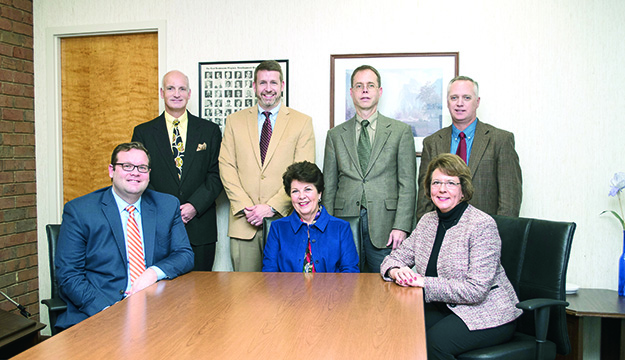By Scott Robertson
Under Director Susan Reid the First Tennessee Development District (FTDD) hasn’t chased headlines. But behind the scenes the organization has been a regional economic development player for years.
It’s not unusual for companies to issue press releases and hold ground-breakings or ribbon-cuttings when they make major hires or purchase a new facility. But what’s rarely said in the releases or the speeches is the role the FTDD played in making the move possible.
“In addition to infrastructure like water lines and sewer lines, we do things on the economic development side like site preparation for new industry, access roads, rail spurs, power lines, that kind of thing,” Reid explains. So whether it be by helping wrangle grant funds, providing loans or just acting as a liaison between the public and private sectors, the FTDD helps businesspeople get business done. And if anyone questions the value of such activities, Reid has only to look back at the first loan she oversaw with the FTDD to answer. “Our first loan in our loan program was to Scott Niswonger when he was getting started,” Reid says. That loan, it’s safe to say, provided a pretty good return on investment.
“We had a couple of loan programs that were federally funded,” Reid says. “Rural Development and the Department of Commerce both gave us funds, and then the state gave us money to match that. So those are revolving funds. We have done about 95 loans. We have a loan committee that oversees our loans. Then we have a loan board with several bankers on it, plus folks like former TVA economic development official Tommy Olterman and ETSU business professor Alan Spritzer.”
At some point, interest developed in doing a private loan program as well. Several banks came together under the FTDD umbrella to help businesses in downtown Johnson City. “Those loans were mostly for facades and internal things,” Reid says. “I believe there were 10 banks that put in $60,000 each. That has gone really well. We have made quite a few loans there. That’s been going on for more than 10 years and they have all renewed.”
Now Greeneville has decided it would like to start the same kind of program, Reid says, “and we have made our first loan in that program. There may be another community coming up very soon to do the same thing.”
Part of the success of the private loan program is the way the FTDD has gone about administering it. “We have had a really good track record with our loans,” Reid says. “We review them very seriously. In fact, we got a little bit of criticism because we didn’t have any bad loans for the first eight to 10 years. But we managed them very well and we made serious decisions. So now we have had three or four defaults through the tough times. But if we had not, that would probably mean we were being too stringent.”
Being at the point of running an organization with a multi-million dollar budget is far from where Reid started with the FTDD. She was originally hired in 1973 as an assistant to the finance director. “I was hired,” she says, “but before I got to work here, the finance director left. So Jack Strickland, the original executive director at the development district asked me when I got to work, ‘How would you like to be the finance director?’ I said, ‘Well, we’ll give it a shot.’”
When she got her first look at the books, she says her heart sank. The FTDD had a grand total of $373 in the bank. “I don’t remember how many employees we had, but $373 was not going to go far,” she remembers.
Strickland and Reid rolled up their sleeves and began catching up on delinquent paperwork so Strickland could go to Nashville and get the funds flowing again. It was an eye-opening experience for Reid, and one that taught her the value of keeping first things first. “Cash flow has never been an issue since,” she says.
Reid worked as both finance director and assistant director before applying for the top job at the district upon the retirement of Tom Moore in 1988. “From 1989 to 2015 we have done 587 grants and loans for $183 million out of the Economic and Community Development Department,” she says. “In 2015, that department did 31 projects and $10 million. I don’t know that that money would have gotten here had (Deputy Director Ken Rea’s*) department not done that. We’re not talking just about money. We’re talking about things like water and sewer service. Sometimes it can be easy to forget about the real impact when you talk about it in terms of dollars instead of the people who benefit.”
2016 will likely see the FTDD enter into a new area of endeavor, Reid says: K-12 education. “We hope to try to make a difference, and our county mayors want to make a difference, in the effort regarding what are called ‘work-ready communities.’ Hopefully we can help improve some reading proficiencies.”
It’s important that the county mayors are on board because they make up a large portion of the FTDD board, and appoint other board members as well. The board includes all the city and county mayors from Carter, Greene, Hancock, Hawkins, Johnson, Sullivan, Unicoi and Washington counties, in addition to one state representative and one state senator from the region. Each county mayor also appoints one industrial development representative to the board.
“(K-12) Education is not an area we’ve worked in before,” Reid says, “but we want to bring in partners to address those issues, because working together is how you get things done. If we can provide our employers with people who are ready to work, and whose skills have been certified, that will be a huge plus. We have to address these education and workforce issues. We don’t have any choice.”
While the K-12 landscape is new to the FTDD, the district does have a history of helping bring consensus and positive change in higher education to Northeast Tennessee. “We have assisted on so many things,” Reid says. “We were supportive on the Medical School effort and the Pharmacy School effort at ETSU. When the region’s elected officials come together with one voice, it can be very effective. We have been fortunate to have a very good board that’s been very involved in these things throughout the years.”
And all the economic development accomplishments have been achieved using only a portion of the FTDD budget and resources. The majority of the funding (and the majority of the 47 staff members) is dedicated to the work done by the Area Agency on Aging & Disability.
“(Our total budget is) $6.8 million and about $4 million to $5 million of that is aging, and is subcontracted out,” Reid says. “We get federal dollars, and we do a lot of contract work with the state. Then we get an allocation of $180,000 from the state legislature. We use that for the most part to match our federal dollars that require a match. We get Appalachian Regional Commission funds and we get Department of Commerce economic development funds. Then the aging dollars are mostly federal dollars that come through the Tennessee Commission on Aging. And we make that $180,000 stretch. We are very frugal.”
From helping businesses get infrastructure to helping create new jobs and investment to helping small rural communities get clean drinking water, Reid says the FTDD offers a unique opportunity to its entire staff. “How fortunate are we that we work somewhere where everything we do is good.”
*Rea is also responsible for the bulk of FTDDs data gathering and analysis, Reid says. Data pulled from the FTDD website can be found on the following two pages.







